进程间通信-信号-pipe-fifo
有名管道FIFO
无名管道应用的一个重大限制是它没有名字,因此,只能用于具有亲缘关系的进程间通信,在有名管道(named pipe或FIFO)提出后,该限制得到了克服。
FIFO不同于管道之处在于它提供一个路径名与之关联,以FIFO的文件形式存在于文件系统中。这样,即使与FIFO的创建进程不存在亲缘关系的进程,只要可
以访问该路径,就能够彼此通过FIFO相互通信(能够访问该路径的进程以及FIFO的创建进程之间),因此,通过FIFO不相关的进程也能交换数据。值得注意
的是,FIFO严格遵循先进先出(first in first out),对管道及FIFO的读总是从开始处返回数据,对它们的写则把数据添加到末尾。它们不支持诸如
lseek()等文件定位操作。
管道的缓冲区是有限的(管道制存在于内存中,在管道创建时,为缓冲区分配一个页面大小)
管道所传送的是无格式字节流,这就要求管道的读出方和写入方必须事先约定好数据的格式,比如多少字节算作一个消息(或命令、或记录)等等
代码实践
#include <stdio.h>
#include <stdlib.h>
#include <sys/types.h>
#include <sys/stat.h>
int main()
{
int res = mkfifo("/tmp/myfifo", 0777);
if (res == 0) {
printf("FIFO created \n");
}
exit(EXIT_SUCCESS);
}

#include <stdio.h>
#include <stdlib.h>
#include <string.h>
#include <fcntl.h>
#include <limits.h>
#include <sys/types.h>
#include <sys/stat.h>
#define FIFO_NAME "/tmp/myfifo"
#define BUFFER_SIZE PIPE_BUF
int main()
{
int pipe_fd;
int res;
int open_mode = O_RDONLY;
char buffer[BUFFER_SIZE + 1];
int bytes = 0;
memset(buffer, 0, sizeof(buffer));
printf("Process %d opeining FIFO O_RDONLY \n", getpid());
pipe_fd = open(FIFO_NAME, open_mode);
printf("Process %d result %d\n", getpid(), pipe_fd);
if (pipe_fd != -1) {
do {
res = read(pipe_fd, buffer, BUFFER_SIZE);
bytes += res;
} while (res > 0);
close(pipe_fd);
} else {
exit(EXIT_FAILURE);
}
printf("Process %d finished, %d bytes read\n", getpid(), bytes);
exit(EXIT_SUCCESS);
}

#include <stdio.h>
#include <stdlib.h>
#include <string.h>
#include <fcntl.h>
#include <limits.h>
#include <sys/types.h>
#include <sys/stat.h>
#define FIFO_NAME "/tmp/myfifo"
#define BUFFER_SIZE PIPE_BUF
#define TEN_MEG (1024 * 1024 * 10)
int main()
{
int pipe_fd;
int res;
int open_mode = O_WRONLY;
int bytes = 0;
char buffer[BUFFER_SIZE + 1];
if (access(FIFO_NAME, F_OK) == -1) {
res = mkfifo(FIFO_NAME, 0777);
if (res != 0) {
fprintf(stderr, "Could not create fifo %s \n",
FIFO_NAME);
exit(EXIT_FAILURE);
}
}
printf("Process %d opening FIFO O_WRONLY\n", getpid());
pipe_fd = open(FIFO_NAME, open_mode);
printf("Process %d result %d\n", getpid(), pipe_fd);
if (pipe_fd != -1) {
while (bytes < TEN_MEG) {
res = write(pipe_fd, buffer, BUFFER_SIZE);
if (res == -1) {
fprintf(stderr, "Write error on pipe\n");
exit(EXIT_FAILURE);
}
bytes += res;
}
close(pipe_fd);
} else {
exit(EXIT_FAILURE);
}
printf("Process %d finish\n", getpid());
exit(EXIT_SUCCESS);
}

管道PIPE
- 匿名管道是右内核管理的一个缓冲区,相当于我们放入内存的中一个纸条。匿名管道的一端连接一个进程的输出。这个进程会向管道中放入信息。
- 匿名管道的另一端连接一个进程的输入,这个进程取出被放入管道的信息。
- 一个缓存区不需要很大,它被设计成为唤醒的数据结构,以便管道可以被循环利用。
- 当管道中没有信息的话,从管道中读取的进程会等待,直到另一端的进程放入信息。
- 当管道被放满信息的时候,尝试放入信息的进程就会等待,直到另一端的进程取出信息。
- 两个进程都终结的时候,管道也会自动消失。
![]()
- 从原理上,匿名管道利用fork机制建立,从而让两个进程可以连接到同一个PIPE上。
- 最开始的时候,上面的两个箭头都连接到同一个进程Process 1上(连接在Process 1上的两个箭头)。
- 当fork复制进程的时候,会将这两个连接也复制到新的进程(Process 2)。
- 随后,每个进程关闭在自己不需要的一个连接(两个黑色的箭头被关闭;Process 1关闭从PIPE来的输入连接,Process 2关闭输出到PIPE的连接),这样,剩下的红色连接就构成了上图的PIPE。
![]()
代码实践
#include<stdio.h>
main( int ac, char *av[] )
{
int i;
printf("Number of args: %d, Args are:\n", ac);
for(i=0;i<ac;i++)
printf("args[%d] %s\n", i, av[i]);
fprintf(stderr,"This message is sent to stderr.\n");
}

#include<stdio.h>
#include<stdlib.h>
#include<unistd.h>
#define oops(m,x) { perror(m); exit(x); }
int main(int ac, char **av)
{
int thepipe[2],
newfd,
pid;
if ( ac != 3 ){
fprintf(stderr, "usage: pipe cmd1 cmd2\n");
exit(1);
}
if ( pipe( thepipe ) == -1 )
oops("Cannot get a pipe", 1);
if ( (pid = fork()) == -1 )
oops("Cannot fork", 2);
if ( pid > 0 ){
close(thepipe[1]);
if ( dup2(thepipe[0], 0) == -1 )
oops("could not redirect stdin",3);
close(thepipe[0]);
execlp( av[2], av[2], NULL);
oops(av[2], 4);
}
close(thepipe[0]);
if ( dup2(thepipe[1], 1) == -1 )
oops("could not redirect stdout", 4);
close(thepipe[1]);
execlp( av[1], av[1], NULL);
oops(av[1], 5);
}
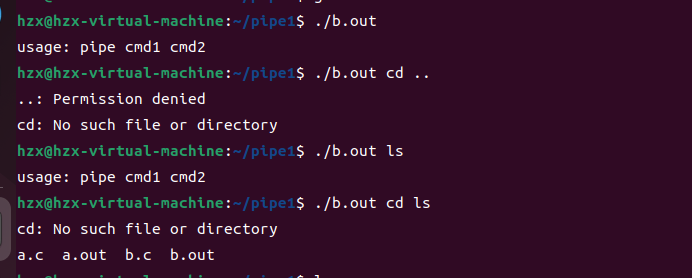
#include<stdio.h>
#include<stdlib.h>
#include<string.h>
#include<unistd.h>
int main()
{
int len, i, apipe[2];
char buf[BUFSIZ];
if ( pipe ( apipe ) == -1 ){
perror("could not make pipe");
exit(1);
}
printf("Got a pipe! It is file descriptors: { %d %d }\n",
apipe[0], apipe[1]);
while ( fgets(buf, BUFSIZ, stdin) ){
len = strlen( buf );
if ( write( apipe[1], buf, len) != len ){
perror("writing to pipe");
break;
}
for ( i = 0 ; i<len ; i++ )
buf[i] = 'X' ;
len = read( apipe[0], buf, BUFSIZ ) ;
if ( len == -1 ){
perror("reading from pipe");
break;
}
if ( write( 1 , buf, len ) != len ){
perror("writing to stdout");
break;
}
}
}
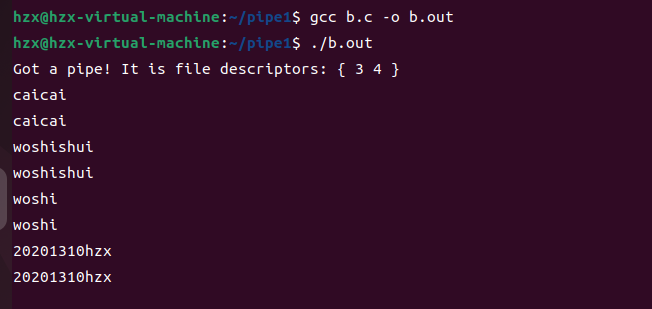
#include<stdio.h>
#include<stdlib.h>
#include<string.h>
#include<unistd.h>
#define CHILD_MESS "I want a cookie\n"
#define PAR_MESS "testing..\n"
#define oops(m,x) { perror(m); exit(x); }
main()
{
int pipefd[2];
int len;
char buf[BUFSIZ];
int read_len;
if ( pipe( pipefd ) == -1 )
oops("cannot get a pipe", 1);
switch( fork() ){
case -1:
oops("cannot fork", 2);
case 0:
len = strlen(CHILD_MESS);
while ( 1 ){
if (write( pipefd[1], CHILD_MESS, len) != len )
oops("write", 3);
sleep(5);
}
default:
len = strlen( PAR_MESS );
while ( 1 ){
if ( write( pipefd[1], PAR_MESS, len)!=len )
oops("write", 4);
sleep(1);
read_len = read( pipefd[0], buf, BUFSIZ );
if ( read_len <= 0 )
break;
write( 1 , buf, read_len );
}
}
}

#include<stdio.h>
#include<fcntl.h>
int main()
{
int fd ;
char line[100];
fgets( line, 100, stdin ); printf("%s", line );
fgets( line, 100, stdin ); printf("%s", line );
fgets( line, 100, stdin ); printf("%s", line );
close(0);
fd = open("/etc/passwd", O_RDONLY);
if ( fd != 0 ){
fprintf(stderr,"Could not open data as fd 0\n");
exit(1);
}
fgets( line, 100, stdin ); printf("%s", line );
fgets( line, 100, stdin ); printf("%s", line );
fgets( line, 100, stdin ); printf("%s", line );
}

#include<stdio.h>
#include<stdlib.h>
#include<fcntl.h>
//#define CLOSE_DUP
//#define USE_DUP2
main()
{
int fd ;
int newfd;
char line[100];
fgets( line, 100, stdin ); printf("%s", line );
fgets( line, 100, stdin ); printf("%s", line );
fgets( line, 100, stdin ); printf("%s", line );
fd = open("data", O_RDONLY);
#ifdef CLOSE_DUP
close(0);
newfd = dup(fd);
#else
newfd = dup2(fd,0);
#endif
if ( newfd != 0 ){
fprintf(stderr,"Could not duplicate fd to 0\n");
exit(1);
}
close(fd);
fgets( line, 100, stdin ); printf("%s", line );
fgets( line, 100, stdin ); printf("%s", line );
fgets( line, 100, stdin ); printf("%s", line );
}

#include <unistd.h>
int main()
{
char *buf = "abcde\n";
write(0, buf, 6);
}

#include<stdio.h>
#include<stdlib.h>
#include<unistd.h>
int main()
{
int pid ;
int fd;
printf("About to run who into a file\n");
if( (pid = fork() ) == -1 ){
perror("fork"); exit(1);
}
if ( pid == 0 ){
close(1); /* close, */
fd = creat( "userlist", 0644 ); /* then open */
execlp( "who", "who", NULL ); /* and run */
perror("execlp");
exit(1);
}
if ( pid != 0 ){
wait(NULL);
printf("Done running who. results in userlist\n");
}
return 0;
}

signal
代码实践
#include<stdio.h>
#include<unistd.h>
#include<signal.h>
#define INPUTLEN 100
void inthandler();
int main()
{
struct sigaction newhandler;
sigset_t blocked;
char x[INPUTLEN];
newhandler.sa_handler = inthandler;
newhandler.sa_flags = SA_RESTART|SA_NODEFER
|SA_RESETHAND;
sigemptyset(&blocked);
sigaddset(&blocked, SIGQUIT);
newhandler.sa_mask = blocked;
if (sigaction(SIGINT, &newhandler, NULL) == -1)
perror("sigaction");
else
while (1) {
fgets(x, INPUTLEN, stdin);
printf("input: %s", x);
}
return 0;
}
void inthandler(int s)
{
printf("Called with signal %d\n", s);
sleep(s * 4);
printf("done handling signal %d\n", s);
}

#include <unistd.h>
#include <signal.h>
#include <stdio.h>
void sig_alrm( int signo )
{
/*do nothing*/
}
unsigned int mysleep(unsigned int nsecs)
{
struct sigaction newact, oldact;
unsigned int unslept;
newact.sa_handler = sig_alrm;
sigemptyset( &newact.sa_mask );
newact.sa_flags = 0;
sigaction( SIGALRM, &newact, &oldact );
alarm( nsecs );
pause();
unslept = alarm ( 0 );
sigaction( SIGALRM, &oldact, NULL );
return unslept;
}
int main( void )
{
while( 1 )
{
mysleep( 2 );
printf( "Two seconds passed\n" );
}
return 0;
}

#include<stdio.h>
#include<signal.h>
void f(int);
int main()
{
int i;
signal( SIGINT, f );
for(i=0; i<5; i++ ){
printf("hello\n");
sleep(2);
}
return 0;
}
void f(int signum)
{
printf("OUCH!\n");
}
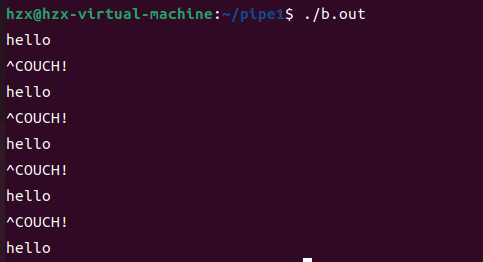
#include<stdio.h>
#include<signal.h>
main()
{
signal( SIGINT, SIG_IGN );
printf("you can't stop me!\n");
while( 1 )
{
sleep(1);
printf("haha\n");
}
}

#include<stdio.h>
#include<string.h>
#include<signal.h>
#include<unistd.h>
#define INPUTLEN 100
int main(int argc, char *argv[])
{
void inthandler(int);
void quithandler(int);
char input[INPUTLEN];
int nchars;
signal(SIGINT, inthandler);//^C
signal(SIGQUIT, quithandler);//^\
do {
printf("\nType a message\n");
nchars = read(0, input, (INPUTLEN - 1));
if (nchars == -1)
perror("read returned an error");
else {
input[nchars] = '\0';
printf("You typed: %s", input);
}
}
while (strncmp(input, "quit", 4) != 0);
return 0;
}
void inthandler(int s)
{
printf(" Received signal %d .. waiting\n", s);
sleep(2);
printf(" Leaving inthandler \n");
}
void quithandler(int s)
{
printf(" Received signal %d .. waiting\n", s);
sleep(3);
printf(" Leaving quithandler \n");
}
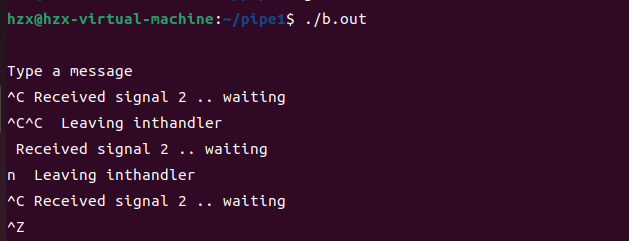
参考
参考链接:https://www.jianshu.com/p/2eb7db04909c
参考链接:https://blog.csdn.net/dxpqxb/article/details/78251551





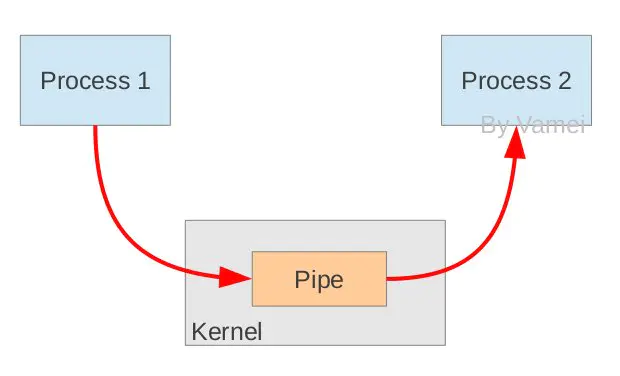
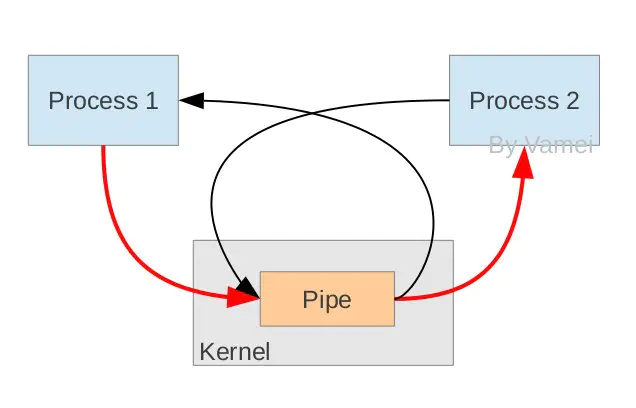


 浙公网安备 33010602011771号
浙公网安备 33010602011771号